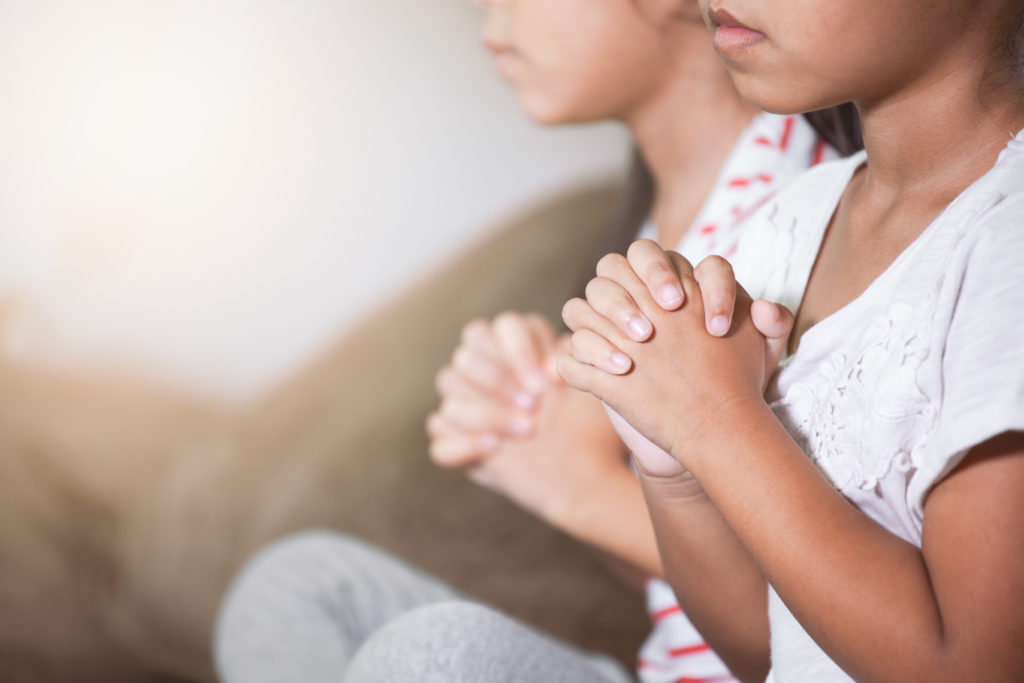 Your questions, answered.
Your questions, answered.
Candidly, as a father of five not-yet-confirmed children, when I first heard of the concept of “restored order of the sacraments of initiation,” I thought it was a terrible idea to lower the age of confirmation to third grade. As I listened and learned, however, I found myself saying to Bishop Thomas John Paprocki, “Please confirm my children as soon as possible!”
I know many parents and grandparents have the same initial reaction to restored order, so I want to share what changed my mind. Here are answers to the common questions I originally had and what friends ask me today. I hope you find this helpful.

Why would we start confirming children at a younger age?
First, it’s important to note that we are not starting something new. Aside from fairly recent history, it has always been the church’s practice to first confirm new members and then welcome them to receive Communion. This practice held for adults and children, alike, and it has continued to the practice of RCIA. In fact, the Catechism of the Catholic Church clearly affirms the proper sequence in paragraph 1322: “The holy Eucharist completes Christian initiation.”
The current approach of inverting the sequence of first Eucharist and confirmation first appeared in France in the middle of the 19th century, as the bishops sought a longer formation period for confirmandi. In 1879, Pope Leo XIII rebuked the French practice and ordered the original sequence to be restored, but the bishops failed to make the change. The practice spread subsequently to the American church as well.
So, the real question is not why we would lower the age of confirmation, but rather what have we gained by deferring it to a later age? The facts in this regard are eye-opening. Consider that nearly 80 percent of all fallen away Catholics were never confirmed, and the average age of Catholics falling away from the faith is 13 years old. By deferring the age of confirmation, we have deprived these children of the gifts of the Holy Spirit, which are strengthened by the sacrament of confirmation. We will never know what might have otherwise happened for them.
OK, but why now? How is this going to help our children?
Bishop Paprocki summed it up best, saying: “Given what our children are confronting in society, why would we delay the grace of confirmation — a grace that can protect them from those dangers.”
Our children are facing an unprecedented barrage of threats to their emotional well-being and moral clarity. With the invasiveness of technology and social media, nearly half of all children report being victims of cyberbullying. More than 70 percent have witnessed cyberbullying and are concerned about it, and victims of cyberbullying are as much as nine times more likely to commit suicide. Girls are twice as likely to be victimized by cyberbullying than boys. Meanwhile, 97 percent of boys have viewed pornography, nearly one quarter have tried to stop but can’t, and 13 percent report watching increasingly graphic and violent pornography.
Deferring confirmation deprives our children of special graces that can help them withstand the spiritual challenges of this new reality. Further, deferring confirmation until they are already swimming in these waters also increases the likelihood that they will experience barriers to the sacramental grace. After all, as St. Thomas Aquinas teaches us, there are three obstacles to grace: lack of faith/insincerity; lack of repentance; and presence of demons. (STL III 66-68) Therefore, delaying confirmation is a double-edged sword: It deprives our children of grace they badly need at a younger age; and it likely decreases the effectiveness of the sacrament in their lives.
Won’t students leave our schools/programs after third grade?
As a point of fact, enrollment in Catholic schools in the Archdiocese of Denver has increased since the implementation of restored order there. This doesn’t mean that restored order caused the increase, but it certainly shows that students didn’t flee the system after third grade. Further, our PSR programs provide sound preparation for the sacraments of initiation. So, there is already a free alternative to Catholic schools. Therefore, sacramental preparation cannot be the only reason parents invest in Catholic education for their children. To be clear, we have much work to do to ensure our schools remain affordable and compelling for students and parents, especially in the formation of the whole person as a disciple of Christ. Sacramental preparation is an important part, but only a part, of this mission.
How can we expect third-graders to be prepared to confirm their own faith as adults in the church?
This question points to a couple common points of misunderstanding regarding the sacrament of confirmation. The first over-emphasizes the action of the confirmand in the sacrament, and the second mistakenly views confirmation as a sort of graduation from faith formation. Paragraph 1308 of the Catechism states: “Although Confirmation is sometimes called the ‘sacrament of Christian maturity,’ we must not confuse adult faith with the age of natural growth, nor forget that the baptismal grace is grace of free, unmerited election and does not need ‘ratification’ to become effective.”
It is certainly important that recipients of the sacraments be properly disposed and prepared to receive the sacraments. As noted above, however, there is a very high probability that a thirdgrader is more open, receptive, and properly disposed to this sacramental grace than an eighth-grader. Conversely, it is more likely that an eighth-grader faces greater obstacles to grace. The church has deemed the age of reason to be the age of 7.
But confirmation and Eucharist in the same year? Isn’t this a lot for children to grasp?
If an 8-year-old is able to understand enough about the Eucharist — that the bread and wine are changed with the words of consecration and become the very Body, Blood, Soul, and Divinity of Christ —and be properly disposed to receive the Eucharist reverently, then it seems reasonable that he or she is also able to understand what it means when we teach that the Holy Spirit gives seven gifts to be used in faith. In fact, this is why the church established the “age of reason” as the appropriate normal age for reception of the sacraments of initiation.
Quoting St. Thomas Aquinas, the Catechism of the Catholic Church wisely reminds us that “age of body does not determine age of soul. Even in childhood, man can attain spiritual maturity: as the book of Wisdom says: ‘For old age is not honored for length of time or measured by number of years’ (4:8). Many children, through the strength of the Holy Spirit they have received, have bravely fought for Christ even to the shedding of their blood” (CCC, 1308).
Will the diocese be offering a curriculum or any kind of lesson planning resources for teachers?
Yes, the diocese is offering resources. Most of the publishers the parishes use already offer curriculum for restored order, since it is becoming increasingly common across the country.
Is this change being made in other dioceses?
This change has been encouraged by both Pope Benedict XVI and by Pope Francis, and many bishops are implementing or planning for the restored order. In the United States, about 15 dioceses to date have implemented the restored order, including Phoenix, Denver and Spokane. Earlier this year, the Denver Archdiocese reported: “The Archdiocese of Denver, as it nears the completion of its transition to Restored Order Confirmation, has seen a number of fruits: greater parent participation in religious education, a new curriculum and parent resources, and a more dynamic approach to catechesis.”

Isn’t this a lot for our teachers?
It is certainly a significant change for our teachers, but our schools are blessed with gifted and talented teachers who are eager to do what is best for their students. Each parish has the flexibility to choose the curriculum and transition approach they feel is best for their teachers and students. So, as your school implements restored order, please be patient. Let’s remember that we should treat this as an opportunity to form lifelong disciples of Christ.
How is this going to work in my school?
Since each parish has flexibility to manage the transition in the way they see fit over the next few years, you should ask your pastor or principal for the plan at your parish or school. Some are taking a slower approach, phasing the change in over time, while others have already completed the transition by confirming children in grades 3-8 in a single year.
Final thought …
Let’s allow the Holy Spirit to do what he does best — inspire, teach, and guide us. I’m confident, if we put our trust in God and faith in the sacraments, restoring the sacraments to their proper sequence will be of great benefit, especially our young people.
Mike Christie is the Diocesan Director of Evangelical Diocesan Director of Evangelical and Catechetical Services and a Parishioner at Blessed Sacrament Parish, Springfield.